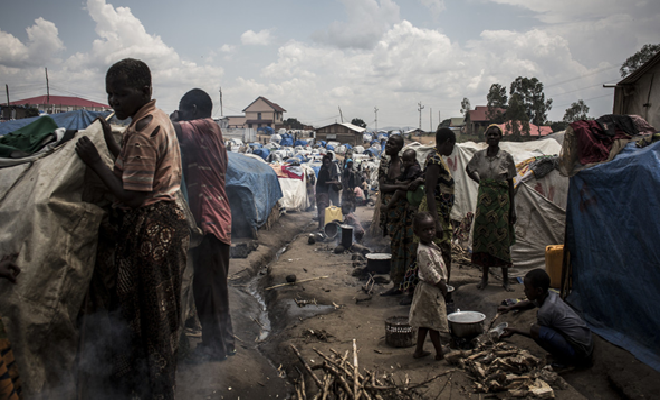DRC has the most number of coronavirus cases in the Horn East and Central Africa (HECA) region. The Forum of National Humanitarian and Development Organizations in DRC (FONAHD-RDC) is a network dedicated to building the capacities of its 98 member organizations and to supporting joint advocacy on human rights, gender and humanitarian needs. In this interview with Patrick Mulemeri, Oxfam’s Rights in Crisis Advisor in the Democratic Republic of Congo (DRC), FONAHD highlights their concern for DRC’s 5.1 million Internally Displaced Persons (IDPs) during the coronavirus pandemic and the importance of national organizations in the response.
Patrick: How has the coronavirus pandemic impacted humanitarian response activities in DRC, particularly for national organizations?
FONAHD DRC: The social distancing measures and movement restrictions have forced both national and international humanitarian actors to reduce their activities. For FONAHD DRC and our member organizations, activities have slowed. Most organizations are struggling to continue minimum engagements with affected communities.
It’s impossible to have in-person coordination meetings. The humanitarian clusters led by UN agencies and international organizations are now holding their meetings and conferences online. Unfortunately, many local and national organizations don’t have reliable internet connections or data to join these teleconferences. National organizations can’t contribute to planning or receive updates about funding for interventions. Thus, the interaction between local, national and international organizations is limited.
Currently, national organizations don’t have funding for immediate actions to help prevent the spread of the virus when it’s now that the provincial governments need to see national organizations as providing a critical complement to government services. International organizations, donors, and UN agencies need to encourage direct funding to national organizations, in line with their commitment under the ‘Grand Bargain’ to strengthen local and national capacities.
Patrick: How do you think the pandemic will impact IDPs and what will help them be prepared?
FONAHD DRC: We’re afraid that the IDP camps are being forgotten, so we’re engaging with the governors to discuss the conditions and the measures needed to avoid the spread of the pandemic within the camps.

If the pandemic arrives in the IDP camps, it will be a health disaster. A good case in point is the Nyanzale-Marché IDP camp in North Kivu, which had a population of 3,546 people in 2019. Following attacks by armed groups, there was a massive displacement of women, men and children in central Nyanzale. Many of the displaced, particularly women, told FONAHD that they witnessed murders, sexual violence and abductions in their homes, and continue to live in fear. The health conditions in the IDP camp are extremely poor. IDPs sleep in huts made from tree branches, lack water and are in urgent need of life-saving assistance and protection. Their main needs are food, shelter, water, sanitation and hygiene, as well as access to education.
People living in the camps are afraid about the possibility of coronavirus spreading. Mr. Harerimana, who lives with his wife and 5 children in Nyanzale-Marché IDP camp, told us that he’s very worried about his family. He remembers that in 2018, lack of water in the camp led to a cholera outbreak. He said that so far, there haven’t been any health measures put in place to prevent or treat the virus should it reach the camps. “We need access to clean water, handwashing stations, and availability of hand sanitizers,” he said.
The government should make plans to collaborate with local and national organizations, and community groups, to ensure there is a system of early warning and monitoring. We are concerned that there aren’t testing kits available, or capacity to treat cases. We need health centres near the camps and more capacity for intensive care including ventilators and personal protective equipment for front-line medical personnel.
We are also worried about the economic impacts of government measures. IDPs have no income resilience. Movement restrictions will make it difficult for people to continue their small businesses. This has negative repercussions on crisis management and on conflict resolution mechanisms. This situation in the long run could lead to unrest, thus giving the government an opportunity to use force and police violence against individuals. With the current restrictions and economic disruptions, we have called on the World Food Programme and the Food Security Cluster to increase food assistance.

We know that food insecurity and financial stress could make IDPs resort to desperate acts. We’re worried about children looking for food outside their immediate homes, and the potential for increased sexual exploitation and abuse. There is also a risk of popular uprising. Lockdown is just not realistic for a population that struggles to survive every day. We need to ensure the protection of IDPs, especially women, children, the elderly and people living with disabilities.
Patrick: How is FONAHD DRC planning to contribute to the coronavirus response?
FONAHD DRC: We’re seeing that fear is infiltrating IDP populations, and that rumours about the pandemic are exacerbating this fear. Many IDPs are not digitally connected. They don’t receive the messages that are circulating from the health ministry. Most of them are getting incomplete information that adds to confusion and stress.
We need a communication strategy to improve understanding and awareness among IDPs. As FONADH DRC, we’ve developed a communication plan, but we don’t yet have enough resources to implement it. We’re also engaging with UN agencies, international organizations and the provincial governments in North and South Kivu, Ituri, Maniema and Kasai to discuss with them the needs of IDPs.
